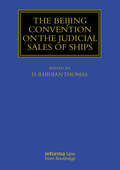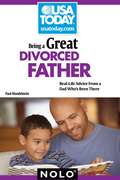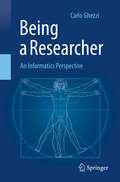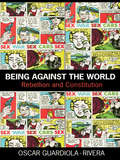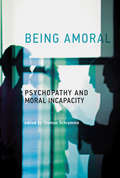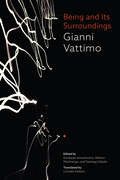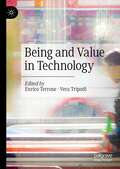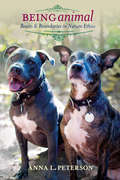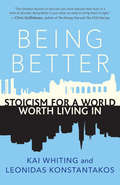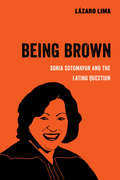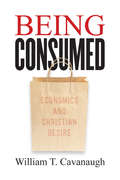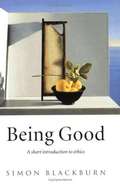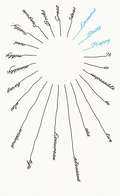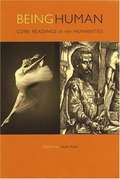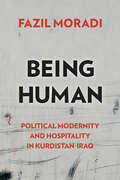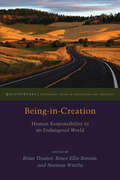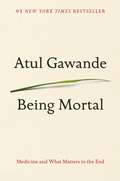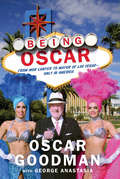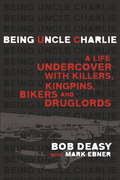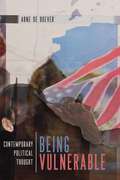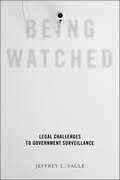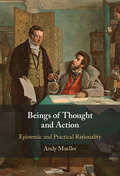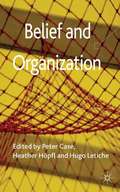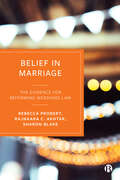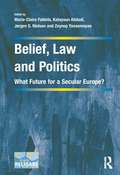- Table View
- List View
The Beijing Convention on the Judicial Sales of Ships (Maritime and Transport Law Library)
by D. Rhidian ThomasFocusing solely on the UN Convention on the International Effects of Judicial Sales of Ships 2023 (the ‘Beijing Convention’), readers of this unique book will gain a full and detailed understanding of the way the Convention functions, its areas of difficulty and ambiguity, and how it relates to present law in common law and civilian jurisdictions, as well as to other related international conventions. It will directly enable States to be better informed in deciding whether or not to adopt the Convention.Providing a full and detailed account of why the Beijing Convention was considered desirable, and the development of the Convention within the CMI and UNCITRAL, this edited book conveys to readers the philosophy and core principles of the Convention. It presents a detailed, expert analysis of the precise provisions of the Convention and an understanding of how the Convention relates to existing maritime jurisdictional traditions, namely Admiralty in the common law, ship arrest in civilian jurisdictions, and Admiralty in the USA. It identifies potential problem areas and offers a critical analysis of the role of the Convention in the face of growing digitalization and specialist platforms for the sale and purchase of ships. Readers will benefit from a reflective evaluation of the merits and deficiencies of the Convention.As the Beijing Convention is currently a highly relevant topic to the international legal maritime world in all its aspects, governments, lawyers, academic institutions, students and the shipping industry generally will be directly interested in the content of this book. The subject is likely to retain its global relevance for many years as individual States consider whether they should ratify the Convention.
Being a Great Divorced Father
by Paul MandelsteinParent successfully after divorce and maintain a close relationship with your kids using this practical advice When you divorce, your kids take top priority. But what does it take to be a great dad after your marital status changes? Being a Great Divorced Father offers the real-world advice you need to maintain a great relationship with your children, even as your relationship with your spouse comes to an end. This book's unique observations and strategies will help you build a new life after your divorce, in which the kids are front and center. It addresses: creating a new home and making room for the kids managing babysitters, after-school care, and other details of daily life creating and enforcing house rules governing homework, TV, computer and game use, and recreation communicating with your ex - being nice, sparing the kids, establishing boundaries, and finding ways to agree settling legal and custody battles dating and remarriage Being a Great Divorced Dad focuses on helping you be the best dad you can be. You'll be able to maintain an extended family through collaboration and cooperation with your former spouse, keeping the focus on your children. Plus, read insights from families who have gone through the challenges of transitioning through a divorce and achieved success. Build a close relationship with your children through the trials of divorce with this book.
Being a Researcher: An Informatics Perspective
by Carlo GhezziThis book explores research from the researchers’ perspective: why to engage in research, what methods to follow, how to operate in daily life, what the responsibilities are, how to engage with society, and the ethical issues confronting professionals in their day-to-day research. The book systematically discusses what every student should be told when entering academic or industrial research so that they can avoid going through the painful process of learning by personal experience and lots of errors. Rather than being technical, it is philosophical and sometimes even anecdotal, combining factual information and commonly accepted knowledge on research and its methods, while at the same time clearly distinguishing between objective and factual concepts and data, and subjective considerations. The book is about scientific research in general and as such holds true for any scientific field. However, it is fair to say that the different fields differ in their research cultures and in their eco-systems. The book reflects the author’s experience accumulated over almost 50 years of teaching graduate courses and lecturing in doctoral symposia at Politecnico di Milano, University of Zurich, TU Wien, Peking University, and at various conferences, and of academic research in informatics (also known as computer science). This book is mainly intended for students who are considering research as a possible career option; for in-progress researchers who have entered doctoral programs; and for junior postdoctoral researchers. It will also appeal to senior researchers involved in mentoring students and junior researchers.
Being Against the World: Rebellion and Constitution (Birkbeck Law Press)
by Oscar Guardiola-RiveraHow can we save politics from the politician? How can we save ourselves? This book looks at the example of those who leave the city and break the social contract, rebellious exiles and freedom fighters escaping the wheel of necessity, and learns from them.
Being Amoral: Psychopathy and Moral Incapacity (Philosophical Psychopathology)
by Thomas SchrammeInvestigations of specific moral dysfunctions or deficits that shed light on the capacities required for moral agency. Psychopathy has been the subject of investigations in both philosophy and psychiatry and yet the conceptual issues remain largely unresolved. This volume approaches psychopathy by considering the question of what psychopaths lack. The contributors investigate specific moral dysfunctions or deficits, shedding light on the capacities people need to be moral by examining cases of real people who seem to lack those capacities. The volume proceeds from the basic assumption that psychopathy is not characterized by a single deficit—for example, the lack of empathy, as some philosophers have proposed—but by a range of them. Thus contributors address specific deficits that include impairments in rationality, language, fellow-feeling, volition, evaluation, and sympathy. They also consider such issues in moral psychology as moral motivation, moral emotions, and moral character; and they examine social aspects of psychopathic behavior, including ascriptions of moral responsibility, justification of moral blame, and social and legal responses to people perceived to be dangerous. As this volume demonstrates, philosophers will be better equipped to determine what they mean by “the moral point of view” when they connect debates in moral philosophy to the psychiatric notion of psychopathy, which provides some guidance on what humans need in order be able to feel the normative pull of morality. And the empirical work done by psychiatrists and researchers in psychopathy can benefit from the conceptual clarifications offered by philosophy.ContributorsGwen Adshead, Piers Benn, John Deigh, Alan Felthous, Kerrin Jacobs, Heidi Maibom, Eric Matthews, Henning Sass, Thomas Schramme, Susie Scott, David Shoemaker, Walter Sinnott-Armstrong, Matthew Talbert
Being and Its Surroundings
by Gianni VattimoGianni Vattimo, one of Europe's foremost contemporary philosophers and most famously associated with the concept of weak thought, explores theoretical and practical issues flowing from his fundamental rejection of the traditional Western understanding of Being as an absolute, unchanging, and transcendent reality. The essays in this book move within the surroundings of Being without constructing a systematic, definitive analysis of the topic. In Being and Its Surroundings, Vattimo continues his career-long exploration of the philosophy of Martin Heidegger, in particular his repudiation of metaphysics with its presupposition of the existence of permanent, universal truth, and that of Friedrich Nietzsche, with its promotion of nihilism. One consequence of problematizing the idea of an attainable truth is the relativization of values and cultures. In the face of the death of God – or the absence of a transcendent guarantor of the validity of human judgments – we have the postmodern tendency to see all value systems and assertions of truth as purely subjective, and to suggest that "anything goes," which Nietzsche called passive nihilism. Vattimo advocates a more active response as he challenges all forms of authoritarianism in the world today. He brings his intellectual acumen to bear on such urgent issues as globalization, the clash of civilizations and terrorism, the crisis of democracy, and the relevance of orthodox religion. Rather than endorse dogmatism or indifference and detachment from social engagement in the name of relativism, Vattimo opts for the path of meaningful dialogue and a search for a mediated consensus based on reason, with all its limitations.
Being and Value in Technology
by Enrico Terrone Vera TripodiDespite numerous publications on the philosophy of technology, little attention has been paid to the relationship between being and value in technology, two aspects which are usually treated separately. This volume addresses this issue by drawing connections between the ontology of technology on the one hand and technology’s ethical and aesthetic significance on the other. The book first considers what technology is and what kind of entities it produces. Then it examines the moral implications of technology. Finally, it explores the connections between technology and the arts.
Being Animal: Beasts and Boundaries in Nature Ethics (Critical Perspectives on Animals: Theory, Culture, Science, and Law)
by Anna PetersonFor most people, animals are the most significant aspects of the nonhuman world. They symbolize nature in our imaginations, in popular media and culture, and in campaigns to preserve wilderness, yet scholars habitually treat animals and the environment as mutually exclusive objects of concern. Conducting the first examination of animals' place in popular and scholarly thinking about nature, Anna L. Peterson builds a nature ethic that conceives of nonhuman animals as active subjects who are simultaneously parts of both nature and human society. Peterson explores the tensions between humans and animals, nature and culture, animals and nature, and domesticity and wildness. She uses our intimate connections with companion animals to examine nature more broadly. Companion animals are liminal creatures straddling the boundary between human society and wilderness, revealing much about the mutually constitutive relationships binding humans and nature together. Through her paradigm-shifting reflections, Peterson disrupts the artificial boundaries between two seemingly distinct categories, underscoring their fluid and continuous character.
Being Better: Stoicism for a World Worth Living In
by Kai Whiting Leonidas KonstantakosPractical answers to the urgent moral questions of our time from the ancient philosophy of Stoicism Twenty-three centuries ago, in a marketplace in Athens, Zeno of Citium, the founder of Stoicism, built his philosophy on powerful ideas that still resonate today: all human beings can become citizens of the world, regardless of their nationality, gender, or social class; happiness comes from living in harmony with nature; and, most important, humans always have the freedom to choose their attitude, even when they cannot control external circumstances. In our age of political polarization and environmental destruction, Stoicism&’s empowering message has taken on new relevance. In Being Better, Kai Whiting and Leonidas Konstantakos apply Stoic principles to contemporary issues such as social justice, climate breakdown, and the excesses of global capitalism. They show that Stoicism is not an ivory-tower philosophy or a collection of Silicon Valley life hacks but a vital way of life that helps us live simply, improve our communities, and find peace in a turbulent world.
Being Brown: Sonia Sotomayor and the Latino Question (American Studies Now: Critical Histories of the Present #9)
by Lázaro LimaBeing Brown: Sonia Sotomayor and the Latino Question tells the story of the country’s first Latina Supreme Court Associate Justice’s rise to the pinnacle of American public life at a moment of profound demographic and political transformation. While Sotomayor’s confirmation appeared to signal the greater acceptance and inclusion of Latinos—the nation’s largest “minority majority”—the uncritical embrace of her status as a “possibility model” and icon paradoxically erased the fact that her success was due to civil rights policies and safeguards that no longer existed. Being Brown analyzes Sotomayor’s story of success and accomplishment, despite seemingly insurmountable odds, in order to ask: What do we lose in democratic practice when we allow symbolic inclusion to supplant the work of meaningful political enfranchisement? In a historical moment of resurgent racism, unrelenting Latino bashing, and previously unimaginable “blood and soil” Nazism, Being Brown explains what we stand to lose when we allow democratic values to be trampled for the sake of political expediency, and demonstrates how understanding “the Latino question” can fortify democratic practice. Being Brown provides the historical vocabulary for understanding why the Latino body politic is central to the country’s future and why Sonia Sotomayor’s biography provides an important window into understanding America, and the country’s largest minority majority, at this historical juncture. In the process, Being Brown counters “alternative facts” with historical precision and ethical clarity to invigorate the best of democratic practice at a historical moment when we need it most.
Being Consumed: Economics and Christian Desire
by William T. CavanaughShould Christians be for or against the free market? For or against globalization? How are we to live in a world of scarcity? William Cavanaugh uses Christian resources to incisively address basic economic matters -- the free market, consumer culture, globalization, and scarcity -- arguing that we should not just accept these as givens but should instead change the terms of the debate.Among other things, Cavanaugh discusses how God, in the Eucharist, forms us to consume and be consumed rightly. Examining pathologies of desire in contemporary "free market" economies, Being Consumed puts forth a positive and inspiring vision of how the body of Christ can engage in economic alternatives. At every turn, Cavanaugh illustrates his theological analysis with concrete examples of Christian economic practices.
Being Good: A Short Introduction to Ethics
by Simon BlackburnThis accessible introduction to ethics continues the trend of Blackburn's best-selling Think. His rare combination of depth, rigor and sparking prose, and his distinguished ranking among contemporary philosophers, mark Being Good as an important statement on our current disenchantment with ethics.
Being Happy (Penguin Great Ideas)
by Epicurus'It is impossible to live the pleasant life without also living sensibly, nobly and justly'The ancient Greek philosopher and teacher Epicurus argued that pleasure - not sensual hedonism, but the absence of pain or fear - is the highest goal of life. His hugely influential lessons on happiness are a call to appreciate the joy of being alive.One of twenty new books in the bestselling Penguin Great Ideas series. This new selection showcases a diverse list of thinkers who have helped shape our world today, from anarchists to stoics, feminists to prophets, satirists to Zen Buddhists.
Being Human: Core Readings in the Humanities
by Leon KassThe Norton Edition of this widely praised collection brings the best writings in the humanities to a college audience. Each chapter presents a question or topic central to the human experience, among them "The Search for Perfection," "Are We Our Bodies?," "Vulnerability and Suffering," and "Human Dignity." To guide students as they read these influential works, every selection is prefaced by a concise headnote and thoughtful discussion questions. How shall we promote and protect human flourishing in a world of ever-emerging technologies? At what point should we limit our quest for physical and mental perfection? Drawing on the insights of great thinkers throughout the ages, Being Human: Core Readings in the Humanities can help give readers a solid understanding of what it means to be human, both in the past and into the future.
Being Human: Political Modernity and Hospitality in Kurdistan-Iraq (Genocide, Political Violence, Human Rights)
by Fazil MoradiThe Iraqi Baʿth state’s Anfāl operations (1987-1991) is one of the twentieth century’s ultimate acts of destruction of the possibility of being human. It remains the first and only crime of state in the Middle East to be tried under the 1948 UN Genocide Convention, the 1950 Nuremberg Principles, and the 1969 Iraqi Penal Code and to be recognized as genocide, crimes against humanity, and war crimes in Baghdad between 2006 and 2007. Being Human: Political Modernity and Hospitality in Kurdistan-Iraq offers an unprecedented pathway to the study of political violence. It is a sweeping work of anthropological hospitality, returning to the Anfāl operations as the violence of political modernity only to turn to the human survivors’ hospitality and acts of translation—testimonial narratives, law, politics, archive, poetry, artworks, museums, memorials, symbolic cemeteries, and infinite pursuit of justice in the Kurdistan Region of Iraq. Being Human gathers together social sciences, humanities, and the arts to understand modernity's violence and its living on.
Being-in-Creation: Human Responsibility in an Endangered World (Groundworks: Ecological Issues in Philosophy and Theology)
by Bruce Ellis Benson Norman WirzbaWhat is the proper relationship between human beings and the more-than-human world? This philosophical question, which underlies vast environmental crises, forces us to investigate the tension between our extraordinary powers, which seem to set us apart from nature, even above it, and our thoroughgoing ordinariness, as revealed by the evolutionary history we share with all life.The contributors to this volume ask us to consider whether the anxiety of unheimlichkeit, which in one form or another absorbed so much of twentieth-century philosophy, might reveal not our homelessness in the cosmos but a need for a fundamental belongingness and implacement in it.
Being Mortal: Medicine and What Matters in the End
by Atul GawandeIn Being Mortal, bestselling author Atul Gawande tackles the hardest challenge of his profession: how medicine can not only improve life but also the process of its ending<P> Medicine has triumphed in modern times, transforming birth, injury, and infectious disease from harrowing to manageable. But in the inevitable condition of aging and death, the goals of medicine seem too frequently to run counter to the interest of the human spirit. Nursing homes, preoccupied with safety, pin patients into railed beds and wheelchairs. Hospitals isolate the dying, checking for vital signs long after the goals of cure have become moot. Doctors, committed to extending life, continue to carry out devastating procedures that in the end extend suffering.<P> Gawande, a practicing surgeon, addresses his profession’s ultimate limitation, arguing that quality of life is the desired goal for patients and families. Gawande offers examples of freer, more socially fulfilling models for assisting the infirm and dependent elderly, and he explores the varieties of hospice care to demonstrate that a person's last weeks or months may be rich and dignified.<P> Full of eye-opening research and riveting storytelling, Being Mortal asserts that medicine can comfort and enhance our experience even to the end, providing not only a good life but also a good end. <P><b>A New York Times Bestseller</b>
Being Oscar: From Mob Lawyer to Mayor of Las Vegas
by Oscar GoodmanIn Being Oscar,one of America's most celebrated criminal defense attorneys recounts the stories and cases of his epic life. The Mafia's go-to defender, he has tried an estimated 300 criminal cases, and won most of them. His roster of clients reads like a history of organized crime: Meyer Lansky, Nicky Scarfo, and "Lefty" Rosenthal, as well as Mike Tyson and boxing promoter Don King, along with a midget, a dentist, and a federal judge.After thirty-five years as a defender, he ran for mayor of Las Vegas, and America's greatest Mob lawyer became the mayor of its sexiest city. He was so popular his image appeared on the $5, $25, and $100 chips. While mayor of Vegas, he starred on the screen in Rush Hour 2 and CSI. He is as large a character in the history of organized crime as any of his clients and as legendary a figure in the history of Las Vegas as the entrepreneurs (his friends and clients) who built the city. This is his astonishing story--the truth, the whole truth, and nothing but the truth.
Being Uncle Charlie
by Bob DeasyBeing Uncle Charlie is the intense, intimate and graphic story of one Canadian undercover cop who spent two decades infiltrating organized crime. From Russian and Italian mafias to notorious biker gangs, Bob Deasy gained access to and the acceptance of criminals who most cops in any country would never encounter or arrest, let alone befriend.Bob Deasy had an illustrious twenty-three year career with the Ontario Provincial Police. Using little more than his quick wits, natural confidence and a deft mental equilibrium that allowed him to stay three chess moves ahead of his quarry, Deasy was the secret weapon behind some of the signature crime busts in Canadian history. Infiltrating the Outlaws Motorcycle Club and the Russian and Italian mobs, he also single-handedly set up international import-export businesses, faked contract hit jobs and executed one of the largest drug buys in OPP history. He also perfected the now controversial "Mr. Big" technique of posing as a crime kingpin to solicit unwitting confessions from suspects in long-dormant cold murder cases--a tactic he defends as he practised it, and with which he enjoyed a 100% success rate.Being Uncle Charlie is a nail-biting ride--sometimes comic, always entertaining--that reads like a one-man history of modern crime, told through the ground-level, insider's perspective of a cop who was able to blend in with the unsavoury, the desperate and the diabolical.
Being Vulnerable: Contemporary Political Thought (Outspoken)
by Arne De BoeverWe are living in a time of acute vulnerability. From climate change to drone warfare, terrorist attacks to mass shootings, safe spaces to trigger warnings, not to mention the COVID-19 pandemic, homo vulnerabilis is once again coming to terms with the fact that it can be wounded, or even killed.Against such finitude, sovereignty is now reasserting itself as a political power that might save us from our ontological state. The irony is, of course, that such sovereignty – for example through camps, walls, police violence, or drones – is also the underlying, historical cause of many of our most intense contemporary experiences of vulnerabilization. Interrupting the dialectic by which sovereignty manages to be both the cause of our vulnerabilization and the phantasmatic tool of its prevention, in Being Vulnerable Arne De Boever explores how today’s experiences of vulnerabilization can be translated into a collective human power that dismantles the form of sovereignty that is producing this state of affairs. Focused on theories, paradigms, and alternative formations of sovereignty, Being Vulnerable reconsiders the tradition of thinking through a political concept in order to approach it anew.
Being Watched: Legal Challenges to Government Surveillance
by Jeffrey L. VagleA riveting history of the Supreme Court decision that set the legal precedent for citizen challenges to government surveillance The tension between national security and civil rights is nowhere more evident than in the fight over government domestic surveillance. Governments must be able to collect information at some level, but surveillance has become increasingly controversial due to its more egregious uses and abuses, which tips the balance toward increased—and sometimes total—government control.This struggle came to forefront in the early 1970s, after decades of abuses by U.S. law enforcement and intelligence agencies were revealed to the public, prompting both legislation and lawsuits challenging the constitutionality of these programs. As the plaintiffs in these lawsuits discovered, however, bringing legal challenges to secret government surveillance programs in federal courts faces a formidable obstacle in the principle that limits court access only to those who have standing, meaning they can show actual or imminent injury—a significant problem when evidence of the challenged program is secret. In Being Watched, Jeffrey L. Vagle draws on the legacy of the 1972 Supreme Court decision in Laird v. Tatum to tell the fascinating and disturbing story of jurisprudence related to the issue of standing in citizen challenges to government surveillance in the United States. It examines the facts of surveillance cases and the reasoning of the courts who heard them, and considers whether the obstacle of standing to surveillance challenges in U.S. courts can ever be overcome. Vagle journeys through a history of military domestic surveillance, tensions between the three branches of government, the powers of the presidency in times of war, and the power of individual citizens in the ongoing quest for the elusive freedom-organization balance. The history brings to light the remarkable number of similarities among the contexts in which government surveillance thrives, including overzealous military and intelligent agencies and an ideologically fractured Supreme Court. More broadly, Being Watched looks at our democratic system of government and its ability to remain healthy and intact during times of national crisis.A compelling history of a Supreme Court decision and its far-reaching consequences, Being Watched is essential reading for anyone seeking to understand the legal justifications for—and objections to—surveillance.
Beings of Thought and Action: Epistemic and Practical Rationality
by Andy MuellerIn this book, Andy Mueller examines the ways in which epistemic and practical rationality are intertwined. In the first part, he presents an overview of the contemporary debates about epistemic norms for practical reasoning, and defends the thesis that epistemic rationality can make one practically irrational. Mueller proposes a contextualist account of epistemic norms for practical reasoning and introduces novel epistemic norms pertaining to ends and hope. In the second part Mueller considers current approaches to pragmatic encroachment in epistemology, ultimately arguing in favor of a new principle-based argument for pragmatic encroachment. While the book defends tenets of the knowledge-first programme, one of its main conclusions is thoroughly pragmatist: in an important sense, the practical has primacy over the epistemic.
Belief and Organization
by Peter Case Heather Höpfl Hugo LeticheExamines the alternative belief systems which contemporary organizational actors live by and through which they seek to find meaning within the dominant (neo)capitalist social order. This volume marks an attempt to move the study of belief forward within management and organization studies.
Belief in Marriage: The Evidence for Reforming Weddings Law
by Rebecca Probert Rajnaara C. Akhtar Sharon BlakeEPDF and EPUB available Open Access under CC-BY-NC-ND licence. In principle, couples getting married in England and Wales can choose to do so in a way that reflects their beliefs. In practice, the possibility of doing so varies considerably depending on the religious or non-religious beliefs they hold. To demonstrate this divergence, this book draws on the accounts of 170 individuals who had, or led, a wedding ceremony outside the legal framework. The authors examine what these ceremonies can tell us about how couples want to marry, and what aspects of the current law preclude them from doing so. This new evidence shows how the current law does not reflect social understandings of what makes a wedding meaningful. As recommended by the Law Commission, reform is urgently needed.
Belief, Law and Politics: What Future for a Secular Europe? (Cultural Diversity and Law in Association with RELIGARE)
by Marie-Claire Foblets Jørgen S. Nielsen Katayoun Alidadi Zeynep YanasmayanThis edited collection gathers together the principal findings of the three-year RELIGARE project, which dealt with the question of religious and philosophical diversity in European law. Specifically, it covers four spheres of public policy and legislation where the pressure to accommodate religious diversity has been most strongly felt in Europe: employment, family life, use of public space and state support mechanisms. Embracing a forward-looking approach, the final RELIGARE report provides recommendations to governance units at the local, national and European levels regarding issues of religious pluralism and secularism. This volume adds context and critique to those recommendations and more generally opens an intellectual discussion on the topic of religion in the European Union. The book consists of two main parts: the first includes the principal findings of the RELIGARE research project, while the second is a compilation of 28 short contributions from influential scholars, legal practitioners, policy makers and activists who respond to the report and offer their views on the sensitive issue of religious diversity and the law in Europe.
